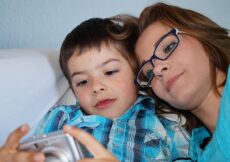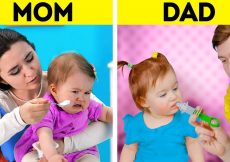Laundry lived in piles. Toys overtook our floor. I lost pacifiers, sippy cups, favoured stuffies. My life was a total wreck until I got the help I needed for my adult ADHD.
I heard the refrains throughout my childhood: If you’d just try a little harder, you’d be first in the class. Why do you keep making careless mistakes? You have no common sense. Can’t you keep quiet? Stop daydreaming.
No one ever considered that I might have ADHD. Those hyper, unfocused, overactive boys who punched each other outside the principal’s office had ADHD. Girls who couldn’t keep our desks clean or proofread their own papers? We were lazy.
My ADHD flew below the radar. I might have all but flunked out of my doctoral program (I was too scared to take my exams, and couldn’t read high-level philosophy, no matter how hard I tried), and I might have turned in every paper with spelling errors, but I chugged along.
That is, until I had kids.
No matter how hard I tried, life seemed like a string of small disasters. My diaper bag always lacked something: wipes, Band-Aids, actual diapers. I couldn’t keep one kid, then two, on a consistent nap schedule (instead, I wrapped them on my back and let them sleep when they wanted. Luckily, that worked for us). I fed them on demand—until they started solids, and then mealtimes would sometimes slip my mind. Their resulting crying jags mystified me. Finally, I’d recall, “Oh yeah, they haven’t eaten.”
Laundry lived in piles. Toys overtook our floor and dishes commandeered our sink. I lost pacifiers, sippy cups, favoured stuffies. If I needed it, I couldn’t find it.
Finally, I collapsed in my psychiatrist’s office and cried. “My life is a wreck and I can’t fix it,” I said.
She listened to my litany of despair: my messy car, my destroyed house, my lost keys, my lack of friends. “Have you ever been screened for ADHD?”
Symptoms of inattentive ADHD, according to ADDitude Magazine, include a failure to “give close attention to details” and making “careless mistakes.” Those who live with it “do not seem to listen when spoken to,” can’t follow directions well, “have difficulty organizing tasks,” lose necessary things, and find themselves “easily distracted.”
I bubbled in a questionnaire for my doctor. When I finished, I cried. I’d coloured in a whole life. “I think you have ADHD,” my doctor told me gently. I cried harder, because life suddenly made sense. Social skills baffled me—kids with ADHD, explains the non-profit Children and Adults with Attention-Deficit/Hyperactivity Disorder, often never learn how to properly interact with others. That requires attention, impulse control and responsibility, things kids (and adults) with ADHD lack: we tend to be inattentive, impulsive, and forgetful. How often did I hear a story, then tell one of my own, when other people would have offered sympathy or asked questions? How often did I interrupt people, who then talked over me, which left me wondering: Why aren’t they listening to me? What did I do wrong?
Others had always attached ugly labels to me: lazy, space cadet, self-centred, crazy, flaky, flighty, weird. “Of course it’s hard for you to make friends,” someone once told me. “You’re just so different.” I’d spent a life convinced something was deeply wrong with me, something unfixable. I thought I’d never have real friends, friends I kept over the long term.
But my ADHD diagnosis explained all of that—from why I constantly lost pacis to why I felt rejected all the time. My doctor started me on Adderall, and with some work on my part, it changed everything. It wasn’t a magic pill. I had to learn to remember important parts of life, from packing my diaper bag to cleaning my car. I still struggle mightily with social skills. But I rely on Adderall to live a normal life.
People have a lot of misconceptions about ADHD. It’s not a sudden, “Look! A squirrel!” (why is it always a freaking squirrel?). I think differently from other people. I develop obsessions easily—think crocheting or baking—and drop them just as easily. I fall into something called “hyperfocus” during which the whole world falls away. I can write or read without realizing my kids are punching each other across the room; I’m too absorbed to notice. I have a hard time reading other people’s emotions or realizing that my words will hurt someone. Sometimes my brain seems like a browser with twenty open tabs.
But now I understand why. While there’s some things I work on changing (keeping track of my keys), it’s much easier to understand and accept myself as I am. I’m neurodiverse. In a world built for people whose brains work one way, mine works another. I give myself space and grace, and my friends—I have them now!—give me space and grace.
I’m different. But different isn’t bad.
Stay in touch
Subscribe to Today’s Parent’s daily newsletter for our best parenting news, tips, essays and recipes.
= 0;if(!is_postback){return;}var form_content = jQuery(this).contents().find(‘#gform_wrapper_13’);var is_confirmation = jQuery(this).contents().find(‘#gform_confirmation_wrapper_13’).length > 0;var is_redirect = contents.indexOf(‘gformRedirect(){‘) >= 0;var is_form = form_content.length > 0 && ! is_redirect && ! is_confirmation;var mt = parseInt(jQuery(‘html’).css(‘margin-top’), 10) + parseInt(jQuery(‘body’).css(‘margin-top’), 10) + 100;if(is_form){jQuery(‘#gform_wrapper_13’).html(form_content.html());if(form_content.hasClass(‘gform_validation_error’)){jQuery(‘#gform_wrapper_13’).addClass(‘gform_validation_error’);} else {jQuery(‘#gform_wrapper_13’).removeClass(‘gform_validation_error’);}setTimeout( function() { /* delay the scroll by 50 milliseconds to fix a bug in chrome */ jQuery(document).scrollTop(jQuery(‘#gform_wrapper_13’).offset().top – mt); }, 50 );if(window[‘gformInitDatepicker’]) {gformInitDatepicker();}if(window[‘gformInitPriceFields’]) {gformInitPriceFields();}var current_page = jQuery(‘#gform_source_page_number_13’).val();gformInitSpinner( 13, ‘https://www.todaysparent.com/wp-content/plugins/gravityforms/images/spinner.gif’ );jQuery(document).trigger(‘gform_page_loaded’, [13, current_page]);window[‘gf_submitting_13’] = false;}else if(!is_redirect){var confirmation_content = jQuery(this).contents().find(‘.GF_AJAX_POSTBACK’).html();if(!confirmation_content){confirmation_content = contents;}setTimeout(function(){jQuery(‘#gform_wrapper_13’).replaceWith(confirmation_content);jQuery(document).scrollTop(jQuery(‘#gf_13’).offset().top – mt);jQuery(document).trigger(‘gform_confirmation_loaded’, [13]);window[‘gf_submitting_13’] = false;}, 50);}else{jQuery(‘#gform_13’).append(contents);if(window[‘gformRedirect’]) {gformRedirect();}}jQuery(document).trigger(‘gform_post_render’, [13, current_page]);} );} );]]>
Read The Full Article Here



































